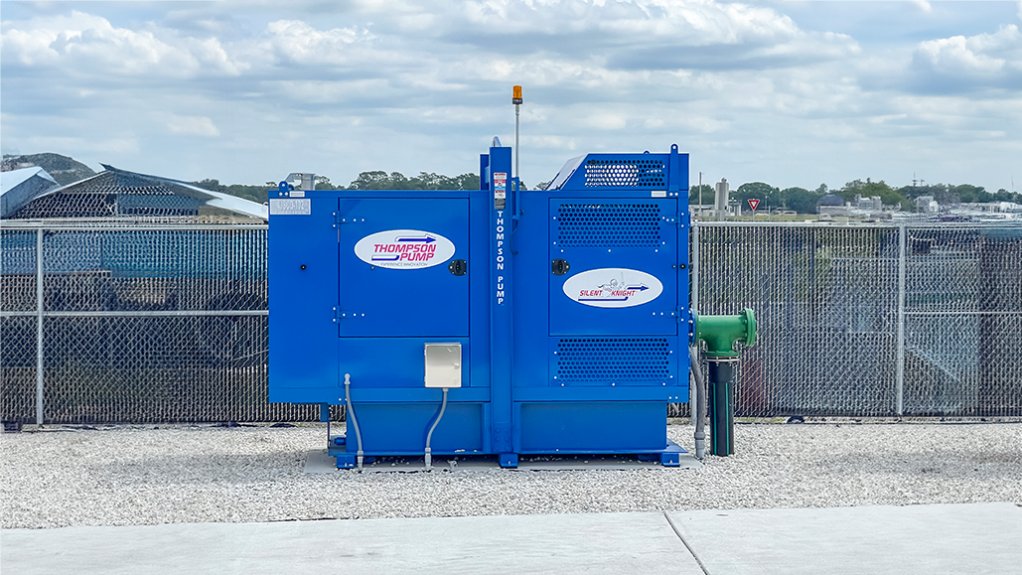Station bypass pumps can withstand any emergency


BUILT TO LAST The performance record of Thompson pumps in bypassing during any emergency led City of North Port officials to prioritize Thompson pumps as a standard emergency backup for critical pump stations
Following the Category 3 Hurricane Irma’s widespread destruction across southwest Florida, in the US, in September 2017, the City of North Port needed immediate funding to improve the overall reliability of the sewer collection system for future emergency events.
After assessing the damage and determining the need for funding to improve the lift stations to prepare for future events, the City of North Port managed to secure about 122 pump stations with only 14 stationary Thompson pumps installed, through the assistance of the Community Development Block Grant for Disaster Recovery and a Community Development Block Grant for Mitigation, which was granted in the fiscal year 2022 through the Department of Housing and Urban Development.
North Port’s Utilities Department implemented a "forward-thinking approach towards effective emergency preparedness" and determined the most effective use of the money was to immediately implement two solutions; to install cured-in-place pipe lining, a trenchless rehabilitation method used to repair existing pipelines, on the wastewater collection system to minimise inflow and infiltration and, to install stationary bypass pumps at eight wastewater lift stations throughout the city before June 1, 2024, which marks the start of hurricane season to prevent sewer overflows.
The eight pumps for North Port will be heading for production at Thompson Pump and Manufacturing Company later this year.
The City of North Port experienced no sanitary sewer overflow at the 14 Thompson pump stations over the last six hurricane seasons, the Thompson Pumps states, adding that this performance record led North Port officials to prioritise the need for Thompson Pump and its equipment’s ability to bypass during any emergency.
The City reportedly called for stationary Thompson pumps to be the standard emergency backup for the critical pump stations. The use of these pumps will also maximise operational efficiency.
Thompson Pump says it recommended its JSC series pumps, the “industry leader for compressor-assisted sewer bypass, emergency response and high head/high-volume applications” to the North Port Utilities, Engineering, Grants and the procurement and finance departments.
North Port contracted for two of the six-inch pumps, with maximum flows of up to about 10 220 l/min, maximum total dynamic heads of about 59.44 m and three-inch solids handling.
It also ordered six of the four-inch pumps.
These pumps are designed for maximum flows of up to about 4 466.80 l/min, maximum total dynamic heads of about 51.81 m, three-inch solids handling, and powered by the Isuzu 4LE2T diesel engine, with ample horsepower for Thompson Pump’s 10-inch self-cleaning impeller while meeting Final Tier 4 emission standards using a diesel oxidation catalyst.
These environment-friendly systems of centrifugal pumps provide fully automatic priming and re-priming without blow-by, large solids handling and feature Thompson Pump’s exclusive Enviroprime System.
The City of North Port now has roughly 35 stationary Thompson Pump installed at new and existing pump stations.
Thompson Pump municipal sales manager David Perry says, “the City of North Port’s Utilities Department and grant team have always prioritised emergency preparedness to protect its residents, visitors and the environment . . . it is truly remarkable the work they do and only one of the many reasons why people from all over the globe are proud to call North Port home.”
The standard specification developed by North Port more than six years ago allows the City to obtain the highest quality pumping systems and more importantly, these Thompson Pump models are sized to handle the peak flow rates, maximum total dynamic head and maximum suction lift required at each station.
Further, the stationary Thompson pumps operate intermittently which allows the pumps to consume less diesel during each emergency event, while allowing inflow and infiltration, where the pump has more flexibility and reduces the overall risk of a sanitary sewer overflow during any major rain event.
Article Enquiry
Email Article
Save Article
Feedback
To advertise email advertising@creamermedia.co.za or click here
Press Office
Announcements
What's On
Subscribe to improve your user experience...
Option 1 (equivalent of R125 a month):
Receive a weekly copy of Creamer Media's Engineering News & Mining Weekly magazine
(print copy for those in South Africa and e-magazine for those outside of South Africa)
Receive daily email newsletters
Access to full search results
Access archive of magazine back copies
Access to Projects in Progress
Access to ONE Research Report of your choice in PDF format
Option 2 (equivalent of R375 a month):
All benefits from Option 1
PLUS
Access to Creamer Media's Research Channel Africa for ALL Research Reports, in PDF format, on various industrial and mining sectors
including Electricity; Water; Energy Transition; Hydrogen; Roads, Rail and Ports; Coal; Gold; Platinum; Battery Metals; etc.
Already a subscriber?
Forgotten your password?
Receive weekly copy of Creamer Media's Engineering News & Mining Weekly magazine (print copy for those in South Africa and e-magazine for those outside of South Africa)
➕
Recieve daily email newsletters
➕
Access to full search results
➕
Access archive of magazine back copies
➕
Access to Projects in Progress
➕
Access to ONE Research Report of your choice in PDF format
RESEARCH CHANNEL AFRICA
R4500 (equivalent of R375 a month)
SUBSCRIBEAll benefits from Option 1
➕
Access to Creamer Media's Research Channel Africa for ALL Research Reports on various industrial and mining sectors, in PDF format, including on:
Electricity
➕
Water
➕
Energy Transition
➕
Hydrogen
➕
Roads, Rail and Ports
➕
Coal
➕
Gold
➕
Platinum
➕
Battery Metals
➕
etc.
Receive all benefits from Option 1 or Option 2 delivered to numerous people at your company
➕
Multiple User names and Passwords for simultaneous log-ins
➕
Intranet integration access to all in your organisation



















